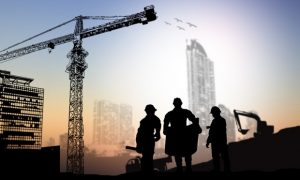A new report from CBRE Research has found that even though work is moving forward on projects in 16 of the top 20 markets for under-construction industrial space during the COVID-19 pandemic, leasing activity on the record 309 million square feet of space that was under construction at the end of 2019 has slowed.
"Prior to the outbreak, there were minimal fears of vacancy rate increases because of robust demand for first-generation space. More than a third of this new construction was already committed by occupiers at year's end," according to the report. "However, occupiers now are taking a wait-and-see approach or are unable to tour sites because of travel restrictions and social distancing policies."
The report concludes that many proposed speculative projects have been put on hold as debt markets have tightened due to uncertainty about how to price risk in the current economic environment.
The authors speculate that the lack of new projects in the pipeline will create a lack of first-generation space coming online for most of the next year and that vacancy rates will drop back to pre-COVID levels by the end of 2021.
The report notes that of the top 20 markets for new industrial construction projects, only Pennsylvania's I-78/81 Corridor, Philadelphia, Central New Jersey, and Oakland, California have shut down construction sites. Projects in New Jersey and Pennsylvania, however, can apply for waivers to move forward if the construction is for buildings used in the distribution of essential products. But even in those sites where construction is moving forward, securing the required inspections and permits has been complicated by the outbreak according to the report.
"While many construction sites remain open, there are challenges to the development process, particularly in securing the required inspections. Large cities have inspectors working while following social distancing protocols, but many suburban municipalities and unincorporated areas do not," according to the report's authors. "This is forcing developers to hire third-party inspectors to complete required inspections. Securing permits for new construction projects is even more problematic and is delaying starts in many markets, since third parties typically are not authorized to issue permits."
Construction work has also been slowed by protocols in place to ensure that workers are maintaining appropriate social distancing. Construction sites have also been outfitted with enough portable toilets to have one for every 10 workers and on-site and sanitation stations. Worksites are also being sanitized between shifts. The report also notes that despite a drop in the prices of certain building materials, supply chain disruptions have led to delays in getting them on site.
© Touchpoint Markets, All Rights Reserved. Request academic re-use from www.copyright.com. All other uses, submit a request to [email protected]. For more inforrmation visit Asset & Logo Licensing.







